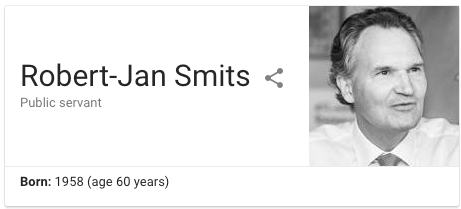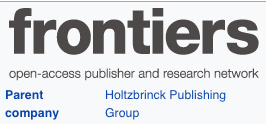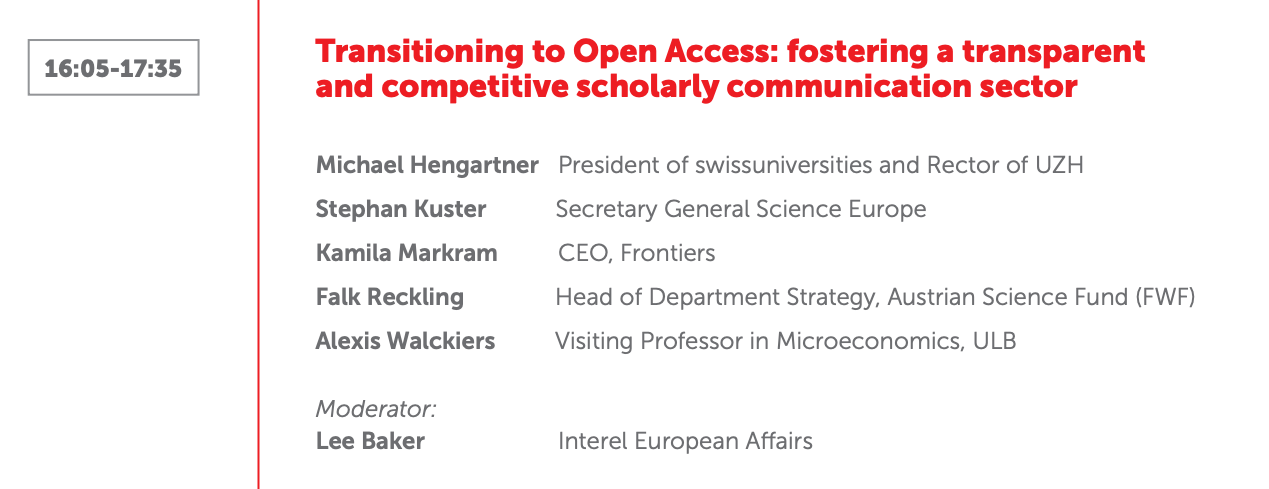Does Plan S Contain Another OA Scandal?
Its main advocate has been friendly with one OA publisher for years, but hides the fact

In 2013, I helped reveal how the NCBI and PubMedCentral (PMC), under David Lipman, broke its own rules in order to provide eLife with expedited publishing services at taxpayer’s expense. This scandal showed how PMC played favorites, allowed US government resources to be used by a UK startup, and sought to cover-up what they had done. It also showed how a public servant (Lipman) lied about what transpired, and how Lipman and others coordinated with eLife to deflect criticism and mislead others.
We may have a similar scandal brewing around Plan S.
Robert-Jan Smits is the main voice behind Plan S, the radical new mandate that would require all research from participating funders to be immediately available online at no cost, cap APCs, seek to eliminate hybrid OA journals, and eliminate all business models except Gold OA. Eliminating hybrid journals and embargoes would benefit pure-play OA publishers. If Smits were found to be cozy with one of these, his motives might look less pure, and potentially conflicted.
Smits presents himself as only interested in the wide availability of scientific research publications via immediate OA. His knowledge panel for a Google search lists him this way:

Yet, he may have ties to an oft-predatory publisher, has apparently misrepresented his involvement with this publisher’s owners, and has been cultivating the publisher’s involvement in Plan S conversations in ways that are attracting scrutiny.
The publisher in question is Frontiers, the Swiss OA publisher. Frontiers generates about US$25 million in annual revenues, based on their stated average APC price for 2017. In 2018, their average APC increased 16%.
You might remember Frontiers as the publisher most responsible for the elimination of Jeffrey Beall’s list of predatory publishers, according to reporting in the Chronicle of Higher Education. When Frontiers was added to the list in 2015, it immediately began attacking Beall’s list, sending complaints to his university. When these didn’t have the desired effect:
[Frederick] Fenter [Executive Editor at Frontiers] traveled from Lausanne, Switzerland, to Denver in December 2015 to personally urge University of Colorado leaders to punish Mr. Beall. He accused the university of being "directly implicated in this absurd and slanderous action," and demanded an investigation of Mr. Beall.
Roughly a year later, after continued pressure, the university accepted Frontiers’ demand and opened a research-misconduct case against the librarian. Mr. Beall responded almost immediately by killing his list.
According to Swiss records, Fenter is a shareholder at Frontiers, as is the CFO and head of HR, among others.
Aside from pressuring Beall’s university with a personal visit from Switzerland, Frontiers also has been known to bring pressure on conference organizers who won’t invite their speakers, to fire editors and editorial boards who don’t accept enough papers, and to have created a manuscript system that some claim makes it “almost impossible” to reject papers. The acceptance rate for their journals is stated to be 81%. However, journalists have found it to be closer to 90%.
According to Swiss records, Frontiers Media SA is held by some staff, the founders, Price-Waterhouse-Coopers, and what look like a couple of individual investors. Records show Frontiers Media SA rolling up to the Frontiers Research Foundation (part of the reason Frontiers has a .org domain), which is managed by the two founders and what looks like an investment manager (Michael Kenyon of White Lighthouse Investment Management). Kamila Markram has stated before that the foundation is meant to allow them to run Frontiers as a non-profit, but why have a person who seems to be an investment manager in that organization? The answer may be simple — the structure (and the investment manager) may help the founders avoid paying taxes on the majority of their profits from Frontiers Media SA.
However, the ownership of Frontiers is murky — Wikipedia lists Frontiers as follows:

This may be simply because the Wikipedia entry is out of date or wrong. However, there was an announcement in 2013 stating that Holtzbrinck acquired Frontiers. Rumors exist to the contrary, as well, and Holtzbrinck is not mentioned in the Swiss records I could locate.
Henry Markram, Kamila’s husband, was the founder of the Human Brain Project, which the European Commission funded in 2013 to the tune of $1.3 billion so he could build a simulation of the human brain. Smits was Director-General of Research and Innovation at the European Commission from July 2010 to February 2018, a span that covers the period when the Human Brain Project was funded and a subsequent scandal.
The relationship between Smits and the Markrams is almost as murky as the ownership of Frontiers. Smits claims to have only met the founders of Frontiers once, in 2018. Yet, according to sources in the EU, Smits and the two founders (Kamila Markram and Henry Markram) of Frontiers go back years, meeting at least as early as 2013 when the Human Brain Project was launched, and possibly becoming acquainted far earlier during the development of a precursor project, the Blue Brain Project (funded by IBM, hence the name).
People I’ve spoken with speculate Smits and the Markrams became acquainted as early as 2006 or 2007, as the Human Brain Project was being conceptualized. Smits had authority or influence over a major slice of research funding in the EU during these years.
A number of researchers later associated with the Human Brain Project served as editors and authors at Frontiers in the initial years (Frontiers was founded in 2007). Some speculate that Frontiers’ editorial board members were among those who advised Smits to approve the Human Brain Project. Whether or not Smits was aware of the possible entanglement between the Markrams and the funded project, this would raise questions about either coordination or capability if true.
In 2015, just two years after the Human Brain Project was launched, the project’s Executive Committee, which consisted of Henry Markram and two others, was dissolved after a review found mismanagement and unrealistic goals. There are now numerous boards guiding the project. It’s hard to believe Smits was not involved in these matters. A scandal involving a project grant-funded to the tune of $1.3 billion is a lot to ignore.
But let’s return to the present day to see what kinds of entanglements exist between Smits and Frontiers around Plan S. Emails unearthed by Leonid Schneider show that not only did Smits and the Markrams recently have email exchanges about Plan S, but many people at Frontiers were routinely copied on the email exchanges about the policy’s discussions and progress, along with members of the European Commission.
In one instance, people on policy calls where Smits provided an overview of Plan S noted that at least one email’s timestamp showed Smits emailing Kamila Markram within 30 minutes of the call ending.
It also appears that Frontiers had a seat at an EC table alongside Smits. Frontiers met with unnamed EC officials on April 25, 2018 to talk about their “innovative business model.” It’s unclear from the minutes if Smits was there, but the separate email threads recovered by Schneider show an email sent at 5:19 PM on the same day with the subject, “Meeting Frontiers and Mr. R-J Smits - Thank you note and next steps.” That seems to indicate he was at the meeting, and perceived to be partnering with Frontiers.
Other emails indicate plans between Kamila Markram and Smits to meet in Vienna for a “catch-up discussion,” while others seem to indicate that Smits was previewing Plan S to Frontiers prior to its release, updating Frontiers on signatories, and seeking feedback from Frontiers prior to finalizing the policy statement.
Frontiers seems to have gained center stage in the Plan S world through this relationship. A meeting next week in Brussels about open science — where it’s suspected the implementation details about Plan S are going to be announced — has one and only one publisher on it, Kamila Markram:

Fenter — the shareholding Frontiers Executive Editor who flew to Denver to confront Beall’s university superiors about their listing as a predatory publisher — is the closing speaker:

Additionally, Frontiers is the sponsoring organization behind the meeting.
This is yet another indication that Markram and Frontiers have been intimately involved in advancing Plan S, and continue to be — this time, with Frontiers sponsoring the meeting where many believe implementation plans will be announced.
Frontiers’ ability to get into meetings with the EC, be involved in the announcement of implementation plans, and to inform policies is exceptional.
Right now, we just don’t know if Smits has been acting in an above-board manner. His involvement with Frontiers may stretch back for more than a decade. His connection currently with one of its founders appears to be coordinated. It looks like he has not been completely honest or forthcoming, and he may have conflicted interests. It also seems like the more people scratch the surface of Frontiers, Smits, and Plan S, the more loose ends appear.
People have told me for months that what has been going on with Smits and Frontiers reminds them of the eLife-NCBI/PMC scandal. As I’ve looked into this over the past few weeks, I can see their point. Having seen before how one lie can lead directly to revelations of an attempted cover-up involving favoritism, policy exceptions, insider dealing, and illicit coordination, I’m wondering if we’re again seeing the tip of an iceberg.